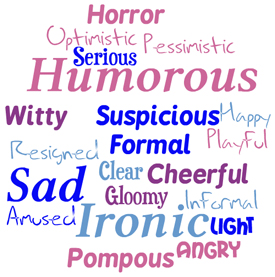
Source: Angry man, Emery Way, Wikimedia
As you now know, tone helps you understand a writer’s attitude toward a piece of writing. The trick is to be able to detect or “hear” an author’s tone as you read. When you understand the tone, words can come to life in your imagination.
For example, if someone writes “I woke up this morning and got ready to go to work,” it’s difficult to figure out the tone because the writer is telling you what’s happening but isn’t showing you anything. In other words, the sentence doesn’t contain specific descriptive words and phrases that allow you to create a picture in your mind.
What if the sentence were changed to this: “The alarm clock’s wretched clanging jolted me from my peaceful, dreamy slumber. With a heavy head and heart, I came to the inevitable conclusion that I must prepare for school.”
Take a look at this list of words that might be used to describe the tone of a piece of writing. There are many, many more “tone” words; this list is just a sampling.

To see more words that could be used to describe tone, click on this link.
So how do you detect tone? Take a look at these highlighted words and phrases that you identified in the first exercise. You should be able to detect the tone of each. Read through each sentence again and answer the questions that follow. Click on the faces (![]() ) to respond.
) to respond.
- She looked at me, her eyes darkening with rage, and hissed, “Save it.”
- The corners of his mouth began to turn up and the room was suddenly filled with the sound of laughter.
- Darkness spread across the skies and the air became heavy, and in the distance a wolf howled.
- “Oh well” he sighed, “no harm done.” He affectionately nudged my shoulder but proceeded to cut me down with a sneer, “Let’s just call it a day.”
- Not looking anyone in the eye, she set her jaw and refused to say what she knew.
- The tone in sentence one is possibly—
- The tone in sentence two is possibly—
- The tone in sentence three is possibly—
- The tone in sentence four is possibly—
- The tone in sentence five is possibly—